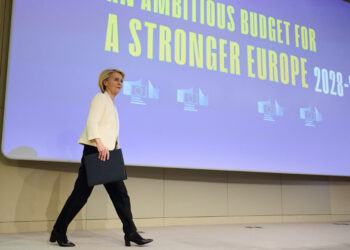Brussels – In the chaotic multi-year spending program presented yesterday (July 16) by Ursula von der Leyen, one certainty remains: a large part of the EU budget 2028-2034 will go to security: military, economic, energy, and food security. The imperative to respond to an “increasingly unstable” geopolitical context also permeates Brussels’ strategy and resources, for the enlargement of the Union and relations with the southern neighbors. In the new financial framework, the European Commission has proposed a doubling of funding for the Mediterranean region and a 37% increase in the financing for candidate countries and the eastern neighborhoods.
“Their security is our security. Their success is our common success,” said European Commissioner for the Mediterranean, Dubravka Šuica, in presenting the proposed spending lines for Global Europe, the EU instrument for neighbors and international cooperation. In particular, the Commission proposes to double the funding for the Middle East and North Africa to EUR 42.5 billion. “We will invest in stability, security, and prosperity, through mutually beneficial partnerships with our Southern neighbors,” the Commissioner continued, citing as examples the cooperation agreements already in place with Tunisia, Egypt, and Jordan.

The extra funds that the EU plans to put on the table for the Southern Neighborhood “will help partners tackle the roots of socio-economic fragility, which lies at the heart of political instability and radicalization,” Šuica insisted. Ahead of the New Pact for the Mediterranean that the Commissioner will present in October, the intention is to work towards cross-cutting agreements, ranging from the “challenge of green transition” to “investments in security and border protection, to better human smuggling and illegal migration.”
In parallel, Brussels is preparing for an inevitable new season of enlargement of its member states. “Accession talks with Montenegro, Albania, Moldova and Ukraine have never progressed faster, and many of our candidate countries have the ambition to conclude negotiations in the coming years,” confirmed Marta Kos, Commissioner for Enlargement, convinced that “the new Multiannual Financial Framework is reflecting this reality” because ” it includes a very significant increase in funding to match the increased speed of candidate countries” from EUR 31 billion to EUR 42.6 billion. “This is an increase of 37 percent,” stressed Kos.
A separate chapter is dedicated to Kyiv, for which the Commission has earmarked 100 billion to support its reforms and reconstruction after 2028. “Funding for Ukraine is kept separate and over and above the budget ceilings,” Kos explained. “Whoever thought European support would weaken over time was wrong,” she concluded. At the same time, the Commissioner sounded a small alarm: for the next two years, before the adoption of the new seven-year budget, Ukraine needs around 80 billion a year “to be able to function as a state, and the EU alone will not be enough.”
English version by the Translation Service of Withub
![Il vicepresidente esecutivo della Commsisione europea, Raffaele Fitto, in commissione Sviluppo delle regioni del Parlamento europeo [Bruxelles, 17 luglio 2025]](https://www.eunews.it/wp-content/uploads/2025/07/fitto-regi2-350x250.png)


![La presidente della Commissione europea, Ursula von der Leyen, presenta la proposta di bilancio pluriennale [Bruxelles, 16 luglio 2025. Foto: Emanuele Bonini]](https://www.eunews.it/wp-content/uploads/2025/07/Vdl-mff-350x250.jpeg)




![[foto: Guillaume Baviere/WikimediaCommons]](https://www.eunews.it/wp-content/uploads/2026/01/Cuba_Che-120x86.jpg)